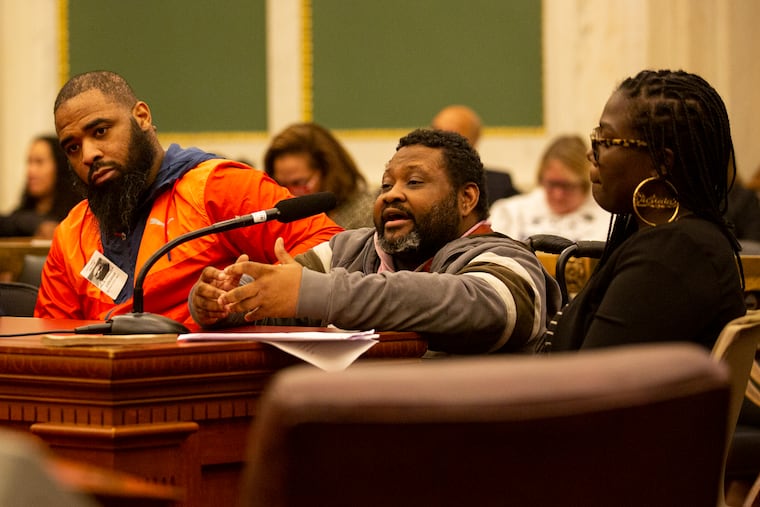Paralyzed gunshot survivors bring their stories and struggles to City Hall | Helen Ubiñas
Victims of gun violence ask: "How long do we have to wait for help?"

Last month, I declared 2020 the Year of the Gunshot Victim, motivated in part by trying to get a survivor compensated after his victim’s assistance check was stolen. The agencies charged to help him just shrugged. He’s still waiting.
But — unexpected optimism alert — this past week turned out to be a pretty good start in getting the city to talk less about helping victims and do more to actually help them. And trust me when I tell you that I had zero expectation of feeling this way when I begrudgingly planned to attend a(nother) City Hall hearing about gun violence on Thursday.
It started a few hours before the hearing while talking with Raynard Washington, the chief epidemiologist for Philadelphia’s health department. Washington is an author of a first-of-its-kind report about paralyzed gunshot victims in Philly. It’s grim: Nearly one in seven city shooting victims ends up paralyzed in some way. As the department continues to collect and analyze data beyond its initial 2016-17 sample, Washington said, that number will likely increase.
Dying from gun violence “is only one outcome,” Washington said. "The others are often much more detrimental and much costlier and more impactful.”
No one knows that more than the survivors I’ve spent years writing about. There is a lot left to dig into, including how to fast-track the long-term care they need. But considering how little information was available when my colleague David Gambacorta and I wrote about some of these survivors last year, this is a — fingers crossed — hopeful development. Especially since data — or the lack of such information — drive so many decisions by those who hold the purse strings.
Well, now there are some cold, hard numbers. And they’re bad. We need to help the people behind them.
Which brings me to the hearing, convened by Councilmember Kenyatta Johnson. Well-intentioned as it was, it started off much like the thousands of meetings about gun violence before it: each person trying to out-sincere the last one. So solemn. So dedicated.
So utterly hollow to many of the very people they claim they’ve always been helping. Because guess what — that claim was news to a lot of the people in the room desperate for help.
And yet, here’s why I remain optimistic: They weren’t having it. Not the young people crushed by violence. Not the family members drowning in trauma. Not the woman who eventually stormed out, disgusted with having to wait to speak until the “experts” had their say. And not the paralyzed gunshot survivors who have mostly been left out of the city’s conversations about gun violence.
I’ve shared a lot of their stories in this space, but it was incredible to witness survivors tell their own stories.
“When I first came home, I was told I was going to get a ramp and all this stuff. I came home and I didn’t get anything,” Jalil Frazier told councilmembers. “I was calling my brother to come help me get out of the house. I had a friend carry me. I was sleeping in the living room because I couldn’t get upstairs.”
Frazier, who eventually moved his family into a more wheelchair-accessible house in New Jersey, was shot and paralyzed in Philadelphia in 2018 after he protected three children during a robbery at a barbershop.
“How long are we supposed wait?” he said.
Jaleel King also testified. King was 8 when he was shot in 1984 by a South Philadelphia neighbor who was angry that kids were setting off fireworks and tried to quiet them with a sawed-off shotgun.
When asked if there were available services for survivors like him, King’s answer was unequivocal: “No.”
“There’s never been help, and if there is help, you have to jump through so many hoops that you get exhausted and give up. So, the answer is no.”
Victoria Wylie is the facilitator for a support group for paralyzed gunshot victims. She said the amount of effort it takes to get basic services for survivors is “ridiculous.” Even if there are programs, she said, they are inaccessible to those who need them most.
Outside the room, Wylie and the guys said they were glad to be able to share their struggles publicly. But they’d wait to see what comes of their pleas for help before they celebrate.
“I hope they heard that they need help with housing, with jobs, with just trying to reclaim their lives,” Wylie said.
“I hope they heard that they didn’t die, they’re alive, and they want to live.”